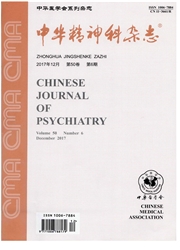

 中文摘要:
中文摘要:
目的比较团体归因治疗(attributional retraining group therapy, ARGT)和SSRIs药物治疗对抑郁和焦虑症状的疗效和"优势靶症状" 。方法采用ARGT与SSRIs药物治疗的随机对照临床试验设计,根据随机化区组方法将存在抑郁和焦虑症状的抑郁症、焦虑症、强迫症门诊患者分为ARGT组(n=63)或SSRIs组(n=66)。采用24项汉密尔顿抑郁量表(24-Items Hamilton Depression Scale,HAMD24)和HAMA在基线和治疗2、4、6、8周后对所有患者进行症状评估。基线和治疗8周后所有患者进行抑郁自评量表和焦虑自评量表评估。采用SPSS 15.0选择约束最大似然法对HAMD24、HAMA 5个时间点的得分进行混合效应线性模型的建立。结果ARGT组54例患者和SSRIs组55例患者完成了研究。2组患者治疗8周后抑郁、焦虑症状均明显改善,且效应值较大(d〉0.8)。混合效应线性模型结果显示,2组治疗前后共5个时间点的HAMD24、HAMA总分得分差异均无统计学意义(F=2.652,P=0.104;F=0.384,P=0.536)。两种治疗对HAMD24和HAMA不同因子所测量的症状得分的混合效应线性模型结果显示,ARGT组的认知障碍、迟缓、绝望感因子得分低于SSRIs组(F=6.932、14.155、7.594,均P〈0.01),SSRIs组的日夜变化因子得分低于ARGT组(0.138与0.299; F=27.986,P〈0.01);ARGT组的抑郁症状(0.885与0.981; F=4.869,P〈0.05)、会谈表现因子得分低于SSRIs组(0.685与0.805; F=8.001,P〈0.01),SSRIs组的焦虑体验因子得分低于ARGT组(0.940与1.129; F=18.075,P〈0.01)。结论ARGT与SSRIs药物治疗抑郁、焦虑症状的总体疗效相当,但具有不同的"优势靶症状" , ARGT为认知、迟缓、绝望感、抑郁症状、会谈表现,SSRIs为日夜变化、焦虑体验。
 英文摘要:
英文摘要:
Objective To explore the efficacy of attributional retraining group therapy (ARGT) versus selective serotonin reuptake inhibitors (SSRIs) on depression and anxiety symptoms of depressive disorder, anxiety disorder and obsessive compulsive disorder, and to compare the overall preferential target symptoms between two treatments. Methods In a case-control study design, outpatients with major depressive disorder, anxiety disorder and obsessive-compulsive disorder were recruited and randomized into ARGT group (n=63) and SSRIs group (n=66) by a blocking random control. All patients were measured with HAMD24 and HAMA at baseline and week 2, 4, 6, 8. Self-Rating Depression Scale and Self-Rating Anxiety Scale were also both utilized before and after 8 weeks treatment. Results Fifty-four outpatients in ARGT group and 55 outpatients in SSRIs group completed the study. At the end of the treatment, all symptom scores were significantly reduced with big effect size (d〉0.8) in both ARGT group and SSRIs group (P〈0.01). By mixed-effects linear model there were no significant differences in total scores of HAMD24 and HAMA between two groups at any visit (F=2.652, P=0.104; F=0.384, P=0.536). The subscale scores of cognition disturbance, retardation and hopelessness of HAMD24 were lower in ARGT group than SSRIs group (F= 6.932, 14.155, 7.594, all P〈0.01), and the diurnal variation score was lower in SSRIs group than ARGT group (0.138 vs. 0.299; F=27.986, P〈0.01). For HAMA subscale symptoms, the scores of depressed symptoms (0.885 vs. 0.981; F=4.869, P〈0.05) and behavior at interview (0.685 vs. 0.805; F=8.001, P〈0.01) were lower in ARGT group and the score of anxious emotions was lower in SSRIs group (0.940 vs. 1.129; F= 18.075, P〈0.05). Conclusions Both ARGT and SSRIs can significantly improve in depressive and anxiety symptoms. The "overall preferential target symptoms" of ARGT should be mainly cognition disturbance, retardation, hopelessness, depressed mood and beha
 同期刊论文项目
同期刊论文项目
 同项目期刊论文
同项目期刊论文
 期刊信息
期刊信息
